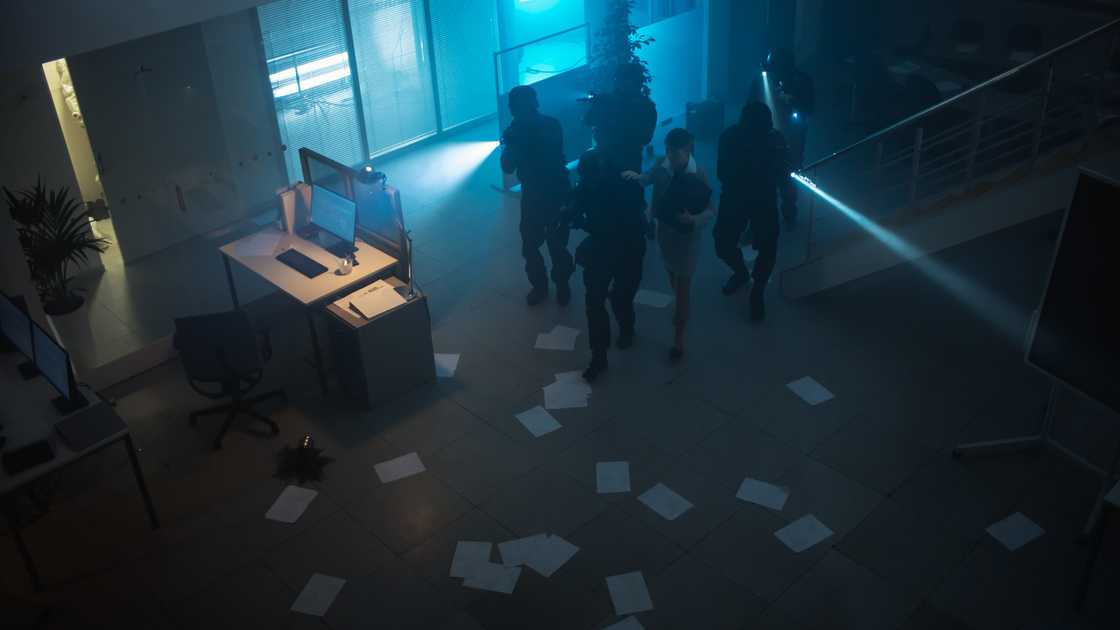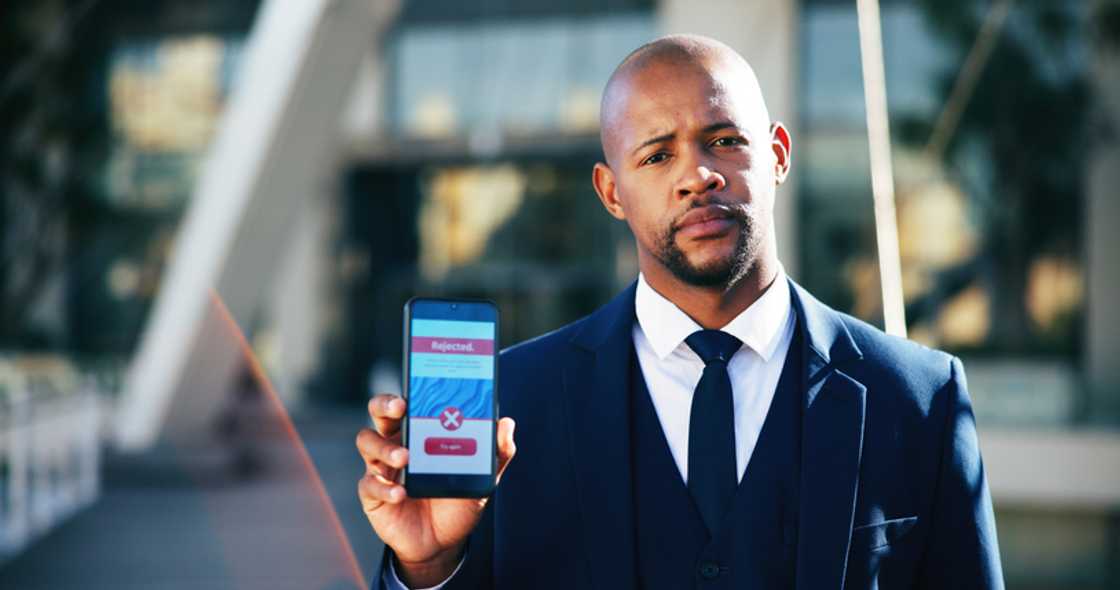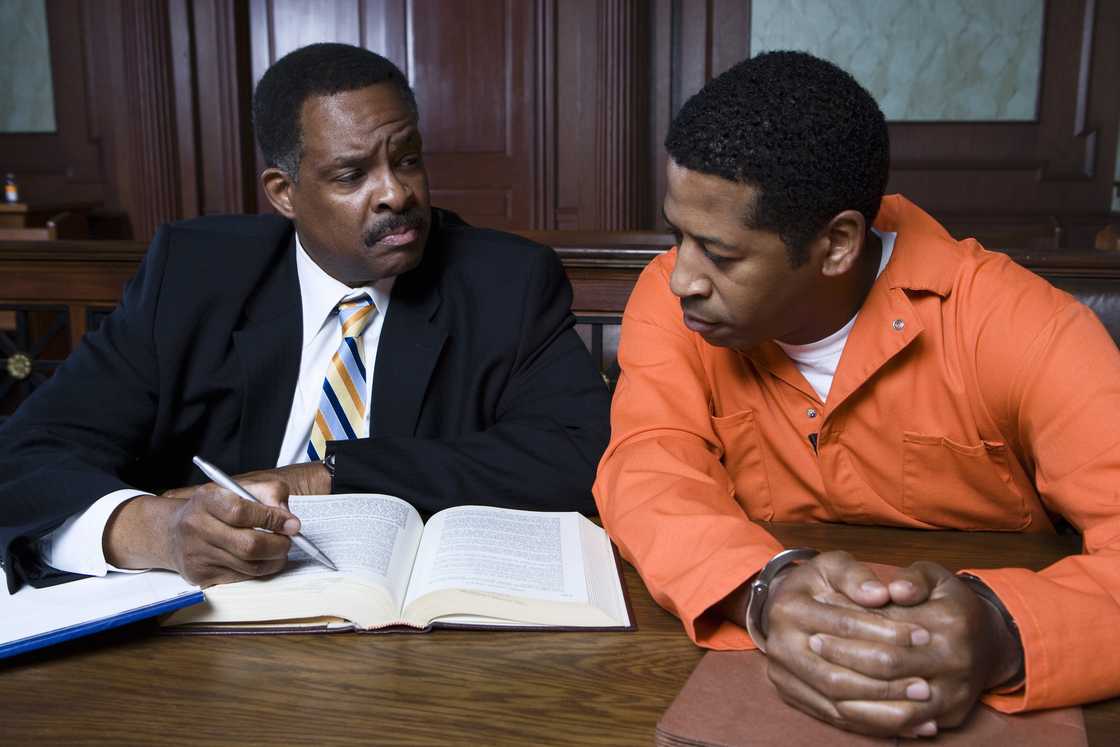“A small fire. Or poison.” Those were the words that broke the stillness of the afternoon. The ceiling fan hummed lazily above my desk, spinning warm Lagos air as I stared at the man seated opposite me. Uncle Richard’s voice was calm, but his eyes burned with something darker than grief.

Source: Getty Images
He leaned forward, his cufflinks catching the light. “Henry, my boy, this last will cannot stand. You and I both know my late brother lost his mind before signing it. The papers need to be redone. You will draft a new will. In exchange, your account will reflect a small fortune.”
I said nothing. My fingers rested on the folder between us: the original copy of Chief Wellington’s last testament. It left the family’s mansion to his daughter, Elizabeth, and set aside trust funds for her stepmother and siblings. To Richard, that was treachery.
“You mean to defraud your own niece?” I asked quietly.
He smiled thinly. “I mean to restore order. That girl is weak. Her mother was an opportunist. And if you think I will let that house become a playground for parasites, you are mistaken.”
His voice dropped again. “You are the executor, Henry. You can make this vanish.”
The ceiling fan clicked once, then twice. I could hear my pulse.
“What if I refuse?”

Source: Getty Images
Richard’s smile did not falter. He adjusted his cufflink and said softly, “Then someone else will make her vanish. A little fire. Or poison, quiet. Accidents happen.”
He stood, leaving a slim brown envelope on the table. “Call me when your conscience stops pretending.”
The door shut behind him. I sat motionless, hearing only the fan and the sound of my heartbeat. In that moment, I realised this was no family feud. It was a line drawn between law and blood, and I was standing on it, alone.
Before all this, the Wellingtons were known in Ikoyi for their quiet dignity and sprawling white mansion. I met them five years earlier when I became their legal adviser. Chief Edward Wellington trusted me with everything: land titles, investments, even letters to distant relatives.

Read also
Elderly woman disappointed after she was sacked from Nana Konadu’s residence for crying too loudly
He was a man of detail and discipline. His younger brother, Richard, was the opposite: ambitious, charming, and always looking for shortcuts. I often saw tension simmer between them during family meetings.

Source: Getty Images
“Richard believes legacy is measured by what you take,” the Chief once told me. “I believe it’s measured by what you leave.”
When the Chief fell ill with lung complications, he called me to his bedside. His voice was weak but clear. “Henry, when I’m gone, ensure the will is read exactly as written. No adjustments. No family negotiations.”
He signed his name carefully beneath my witness line. That same evening, Richard arrived at the hospital with documents he claimed were “updated instructions.” I refused to stamp them. It was the last time the brothers saw each other alive.
After the funeral, Richard became a shadow that haunted every conversation. Elizabeth, the Chief’s daughter from his first marriage, returned from the UK for the reading. Her stepmother, Evelyn, remained distant but polite. The rest of the family gathered; their faces wore sympathy, but reeked of expectation.

Source: Getty Images
When I read the will aloud in the family’s drawing room, silence followed, then outrage.

Read also
Lydia Forson celebrates her 41st birthday in style with a hand-painted top and a stylish green skirt
“The mansion to Elizabeth?” Richard barked. “And the company shares to a charity? This is madness!”
I explained the clauses, but he stormed out. That night, I received a message from an unknown number: “You’ve made an enemy of blood.”
Two weeks later, the newspapers ran stories about a “disputed inheritance.” Reporters camped outside my office. Anonymous callers accused me of fraud. I knew whose hand was stirring the chaos.
Then, on a quiet Monday, he arrived in person: perfume, arrogance, and venom mixed into one, and dropped his offer across my desk.
It was not a request. It was an ultimatum.
The next few days blurred into a paranoia. Each knock on my office door startled me. My assistant noticed my jumpiness but didn’t say anything to me. At night, I checked every shadow outside my flat.

Source: Getty Images
Elizabeth called once. “Uncle has been visiting the house,” she said. “He says you’re delaying probate. Is that true?”
“No,” I said. “He’s lying. Do not engage him.”
She hesitated. “He said he can ‘make things disappear.’ What does that mean?”
I didn’t answer.
That evening, Richard sent another message: “You have forty-eight hours. Decide whether your loyalty is to law or lineage.”
I printed the message and filed it under evidence. But fear has a way of dulling courage. I found myself imagining his threat, the “small fire” he mentioned. Elizabeth lived alone in the mansion, save for a housekeeper.
On Wednesday, I drove to her house under the pretext of reviewing trust paperwork. She met me at the gate, eyes tired but steady.
“Mr Cole, you look worse than I,” she joked softly.
“Lock your doors,” I said. “And do not entertain your uncle.”
Her expression changed. “It’s that bad?”
I nodded. “Worse.”

Source: Getty Images
That night, I drafted a confidential letter to the Lagos State Police Command, outlining the threats, the bribe, and my suspicion that Richard intended harm. I requested surveillance on both Elizabeth’s property and my office.

Read also
Ghanaian woman gets emotional as her son reports to school as a first-year student, video trends
By Thursday, he called again. “Henry,” he drawled, “you disappoint me. Do you think I’m bluffing?”
“I think you’re desperate,” I replied.
“Desperation,” he said, “is the engine of survival.”
I hung up. Moments later, a text arrived: “Meet me tomorrow at 3 p.m. No aides. Bring the will.”
I agreed. But I was no longer walking in the dark.
Friday afternoon, he arrived precisely on time. He wore a grey suit, a silk tie, and a smirk. “You came,” he said.
“I said I would,” I replied, sliding a folder across the table. “But before you open it, tell me, Uncle Richard, why risk everything?”
He laughed. “Because history belongs to the bold. My father built that house. Edward stole it. I’m taking it back.”

Source: Getty Images
As he spoke, he reached for the folder, unaware that a small camera above my bookshelf streamed every word to the police headquarters.
Then his voice hardened. “If you refuse to sign, you will wake up to smoke. Or worse, headlines.”
“Not with innocent lives,” I said quietly.
He frowned. “What did you say?”
The knock came at once, firm, sharp, final.
The door opened, and uniformed officers stepped in.
Richard froze. “What is this?”
“An audience,” I said.
Cuffs clicked. A murmur rose from the hallway: press reporters, lenses flashing.
The game had ended before it began.
The sting had been planned three days earlier with a discreet division of the Lagos Police Command. I had given them everything: texts, call logs, the bribe envelope. The Deputy Commissioner approved a covert setup at my office.

Source: Getty Images
The “meeting” Richard demanded became his trap. The police dusted the brown envelope he left behind for fingerprints. The hidden camera streamed to a secure channel where two officers and a reporter from The Guardian watched in real-time.
When they entered, Richard’s face turned from arrogance to disbelief. “You set me up?” he hissed.
“No,” I said. “You set yourself up. I just opened the door.”
Authorities escorted him out while photographers snapped pictures. Within hours, the story trended online: “Businessman Arrested for Attempted Will Manipulation and Death Threat.”
Calls flooded my office. Elizabeth’s was the only one that mattered.
“Is it over?” she whispered.
“For now,” I said. “But the mansion will need more than walls to stay safe.”
That evening, the police recovered several unsigned property documents from Richard’s home, proof that he had forged versions of the will in advance. They also found evidence linking him to a recent house fire in Lekki.

Source: Getty Images
By nightfall, the Wellington mansion gates were closed under police protection. Elizabeth’s relatives gathered there in stunned silence as the news aired. She stood on the balcony, her face pale but resolute.
When I arrived the next morning, she said softly, “He always said the mansion belonged to blood. He never realised integrity runs deeper.”
We sat in the garden as dawn broke. The jacaranda trees shimmered purple in the light, their petals falling like confetti of truth.
For the first time since the Chief’s death, the house felt like home again, not a battlefield.
The court moved swiftly. Authorities filed charges of attempted fraud and conspiracy against Richard after obtaining his recorded confession and forensic evidence. The court denied him bail.
The whole country became interested in the case. On social media, debates raged about greed, inheritance, and morality. Some said I had betrayed family ties. Others called it bravery. I stayed silent.

Source: Getty Images
I received Elizabeth’s gratitude in small gestures: a thank-you note, home-cooked meals delivered to my office, and one evening, a framed quote from her father, “A will is a voice of the dead; breaking it murders the living.”
The words sat on my desk like scripture.
A few months later, the mansion reopened for a charity event supporting widows and children. Elizabeth transformed her inheritance into a foundation named after her father. As I stood at the gate greeting guests, I noticed something remarkable: people no longer spoke of scandal but of legacy.
During the event, a journalist asked me, “Why risk your career over one client’s will?”
I replied, “Because the law is not a mirror for convenience. It is a window for truth.”
He smiled. “And what of Uncle Richard?”
“He’ll have time to reflect,” I said. “Justice gives everyone a seat, some in courtrooms, some in cells.”

Source: Getty Images
Months passed. The police closed their file. Life returned to its slow rhythm. But I often replayed that first conversation: the whispered threat, the fan humming overhead, the moment greed dressed itself as family loyalty.
One afternoon, I visited Richard’s prison. He looked smaller, quieter.
“Why come?” he asked.
“To say I forgive you,” I said. “But you must also forgive yourself. Hate will bury you deeper than any sentence.”
He didn’t answer.
As I turned to leave, he murmured, “You sound like Edward.”
Perhaps that was the closest he could come to peace.
Looking back, I realise that justice is not always loud. Sometimes, it’s a whisper that refuses to be drowned by money or fear.
In a world where wealth can buy silence, the true cost of integrity is loneliness. That night in my office, I faced not only Richard’s threat but my own reflection. Would I trade principle for comfort, or stand in the storm and keep my name clean?

Source: Getty Images
Nigeria teaches you that morality can feel like madness when surrounded by power. Yet, the moment you bend the law for convenience, you stop being a servant of justice and become its enemy.
I often tell young lawyers: “A case may end in court, but your conscience begins at home.”
The Wellingtons’ mansion stands firm today, not because of walls or guards, but because truth has a foundation deeper than inheritance.
Elizabeth’s foundation now sponsors legal scholarships for young women, proof that righteousness, though mocked at first, multiplies quietly.
If I had taken Richard’s envelope, perhaps no one would have known. But one day, someone would have seen the cracks. Lies are like smoke; they always find their way through.
Chief Wellington once told me, “A man’s legacy is not in the land he leaves, but in the light he follows.”

Source: Getty Images
Those words return to me whenever I walk past the courthouse gates, briefcase in hand.
So I ask you: when the test comes and the offer glitters before you, what will you protect: your comfort, or your name?
Because one day, when the fan hums over your desk and temptation whispers like family, you will have to decide which side of the will you stand on.
This story is inspired by the real experiences of our readers. We believe that every story carries a lesson that can bring light to others. To protect everyone’s privacy, our editors may change names, locations, and certain details while keeping the heart of the story true. Images are for illustration only. If you’d like to share your own experience, please contact us via email.
Source: YEN.com.gh
Source: Yen.com.gh


















